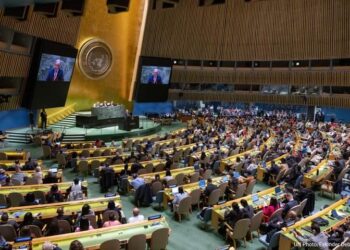In order to combat plastic pollution, the Wild Africa Fund launched a month long campaign to raise awareness about the threats of plastic pollution and its impact on oceans and marine wildlife. HELEN OJI reports.
In commemoration of World Environment Day, the globe has to reflect the impact of human activities on the environment while encouraging renewed public commitment to protecting the earth. This year’s theme, “ Beat Plastic Pollution”, represents an urgent call for the world to reduce plastic waste while finding local solutions to the damages caused by plastic pollution to the environment and wildlife.
Damaging environment
Nigeria Representative at Wild Africa Fund, Festus Iyorah said “Plastic pollution is a huge and widespread problem in Nigeria. Single-use plastic has now become part of our daily lives. Sadly, its constant use and accumulation as waste is damaging our environment, ocean and marine species, such as sea turtles.
“Plastic pollution particularly affects marine habitats and the aquatic species that call the ocean home. Hundreds of sea turtles die annually from getting trapped in plastic waste in the oceans and beaches. Sometimes they eat plastic they mistake for sea grass and consuming just one plastic item can have fatal consequences for sea turtles. In Nigeria, sea turtles are particularly at high risk of becoming extinct without further human intervention.
Plastic waste
Today, the world produces about 400 million tons of plastic per year. Of that, only less than 10 per cent is recycled, according to the United Nations Environment Programme (UNEP). In Nigeria, 2.5 million tonnes of plastic waste is generated every year and 88 percent of these plastics are not recycled. As a result, they end up in waterways, dams, lagoons, and the ocean.
Founder at Wild Africa Fund, Peter Knights said, “Countries such as Rwanda have done a tremendous job reducing plastic usage and virtually eliminating visible plastic pollution greatly enhancing their environment and image. It takes political will and public participation, but Nigeria could be a regional leader in reducing plastic usage and moving from indiscriminate dumping to recycling or safe disposal.
“Wild Africa Fund is producing media messages to help the public understand the impact of plastic waste on sea turtles and marine habitats. In addition, we have been profiling local conservationists saving sea turtles and working with local nonprofits and government agencies to rescue marine life being sold on the streets of Lagos.
“Wild Africa Fund is also committed to working with the Federal Government of Nigeria and state governments to protect the environment from plastic pollution and deploy local solutions to protect our oceans and marine life from plastic waste,” added Knights.
Treat waste
The Permanent Secretary of the Federal Ministry of Environment, Ibrahim Yusufu Idris, said this event is very apt and could not have come at a more auspicious time than now when the global community including Nigeria is making concerted efforts to address the challenges of waste and plastic pollution frontally as demonstrated by the ongoing global negotiations for the establishment of an international legally binding instrument on plastics pollution and the Global Waste Initiative 50 by 2050 that sets the ambition to recycle and treat at least 50% of waste produced in Africa by 2050.
“Nigeria is no stranger to the concerns over the increasing quantum of plastic waste in our environment from all manner of sources such as packaging/storage of food, drinks and beverages, shopping, etc. as they litter the environment, block drainages resulting in flooding and also release toxic gases when burnt or incinerated with devastating effects on our health and the environment.
The fastest growing population
According to him, Nigeria is one of the countries with the fastest growing population in the world and produces enormous volumes of wastes as a result of her prevalent linear economy (extract-make-use-dispose) approach to production and consumption, where materials are used to manufacture products that last one lifespan before becoming waste. This approach is particularly resource inefficient and contributes significantly to resource depletion and waste generation, hence, inimical to the achievement of sustainable development goals. It has therefore become imperative to adopt the circular economy model in which the productive use of resources is enhanced over time to promote sustainable development.
Regulatory framework
Idris stated that this concept is gaining traction all over the world as a model of production and consumption, which involves sharing, leasing, reusing, repairing, refurbishing and recycling existing materials and products as long as possible, thus extending the life cycle of products and generating wealth along the value addition chain.
The Ministry has made steady progress in the adoption and implementation of circular economy in order to promote environmentally sound management of wastes. Putting in place appropriate Policies, legal and regulatory
framework that support circular economy, such as: National Policy on Solid Waste Management; – National Policy on Plastic Waste Management; – National Policy on Waste Battery Management; – Implementation of the Extended Producer Responsibility (EPR).
Development and implementation of specialized programmes and projects that incorporate circular economy principles, such as: Community based waste management programme that encompasses waste separation at source, recycling and composting.
Waste to wealth entrepreneurship
Waste to wealth entrepreneurship programme for the empowerment of the most vulnerable groups especially youth and women to boost recycling activities.
“Plastic has become an integral part of the society due to its wide range of uses and economic benefits. However, it has negative consequences to human health, natural ecosystems and the climate.
Idris added that their need to drive investments in the circular economy, a robust regulatory framework and effective enforcement are critical. This is necessary to address all forms of unsustainable consumption and production patterns, either by creating standards or prohibiting entirely certain operations and activities.
The menace of plastic pollution
He urged state government, stakeholders, private sector and civil society all hands must be on desk to build against the menace of plastic pollution.
Idris commended all the relevant stakeholders and Development Partners for their support to Nigeria in addressing her numerous environmental challenges particularly plastic pollution.




